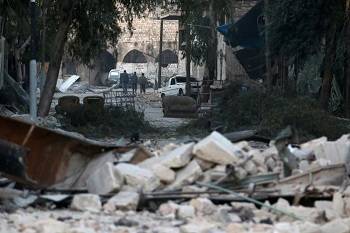France has accused Syria and its allies of using political uncertainty in the United States to launch "total war" against opposition-held areas in the country and called for new sanctions on Bashar al-Assad's regime for the use of chemical weapons.
Making the accusations after a weekly cabinet session on Wednesday, Jean-Marc Ayrault, France's foreign minister, said that countries opposed to the Syrian president would meet soon.
Donald Trump's inauguration as the new US president will not happen until January 20 next year and President Barack Obama's outgoing administration is not expected to take an active role in Syria so close to leaving office.
European diplomats have expressed concern that Assad may feel emboldened by Trump's pledge to build closer ties with Russia, Syria's ally.
"Today one million people are besieged, not just in Aleppo, but in Homs, Ghouta and Idlib, and that's the reality of the situation in Syria," Ayrault said in Paris.
He did not say what the planned meeting might achieve, but said protecting Syrian civilians was an urgent priority.
"France is taking the initiative to confront this strategy of total war by the regime and its allies, who are taking advantage of the current uncertainty in the United States."
Meeting planned
The proposed meeting of countries opposed to Assad, including the US, Saudi Arabia and Turkey, will take place in the near future in Paris, Ayrault said.
France, a staunch backer of the anti-Assad opposition, is now actively pushing for a UN Security Council resolution to sanction Syria for the use of chemical weapons, he said.
An inquiry by the United Nations and the Organization for the Prohibition of Chemical Weapons has already found that regime forces were responsible for three chlorine gas attacks and that ISIL group had used mustard gas.
"It's been proved that the regime and ISIL have used chemical weapons, so we now need sanctions and that's the resolution we want at the UN. The international community must stop turning a blind eye," Ayrault said.
"We aren't going to sit and do nothing."
Russia has said that the inquiry's findings cannot be used to take action at the Security Council and that the Syrian regime, which denies using chemical weapons, should investigate the accusations.
Meanwhile, on the ground, doctors and activists in Syria are calling on the international community to airdrop supplies in opposition-held eastern Aleppo.
They are also calling for a safe passage for civilians, and want the UN to monitor it.
At least 13 people were killed in fighting in Aleppo on Wednesday, according to rescue workers.
They said they have been trying to recover the injured, but there are no hospitals left to take them to following Syrian regime's latest assault on medical facilities in opposition-held areas.
The UK-based Syrian Observatory for Human Rights said that dozens of civilians tried to flee the besieged parts of Aleppo on Wednesday but were stopped from escaping because of fighting.
On Tuesday, the Syrian army issued a statement accusing opposition fighters of holding civilians as "hostages".
"Permit those citizens who want to do so to leave, stop using them as hostages and human shields, clear the mines from the crossings identified by the state," it said.
Anti-regime groups deny they are preventing civilians from leaving and accused the regime of spreading "rumors".
Renewed assault
The Syrian regime army - backed by allied forces from Iran, Russia and the Shia Lebanese group Hezbollah - launched a renewed assault on east Aleppo on November 15.
The offensive has killed at least 143 civilians in the city's east, among them 19 children, and more than 375 in all of Aleppo province.
PHOTO CAPTION
People walk near rubble of damaged buildings, in the opposition-held besieged area of Aleppo, Syria November 19, 2016. REUTERS
Al-Jazeera


 Home
Home Discover Islam
Discover Islam Quran Recitations
Quran Recitations Lectures
Lectures
 Fatwa
Fatwa Articles
Articles Fiqh
Fiqh E-Books
E-Books Boys & Girls
Boys & Girls  Articles
Articles










